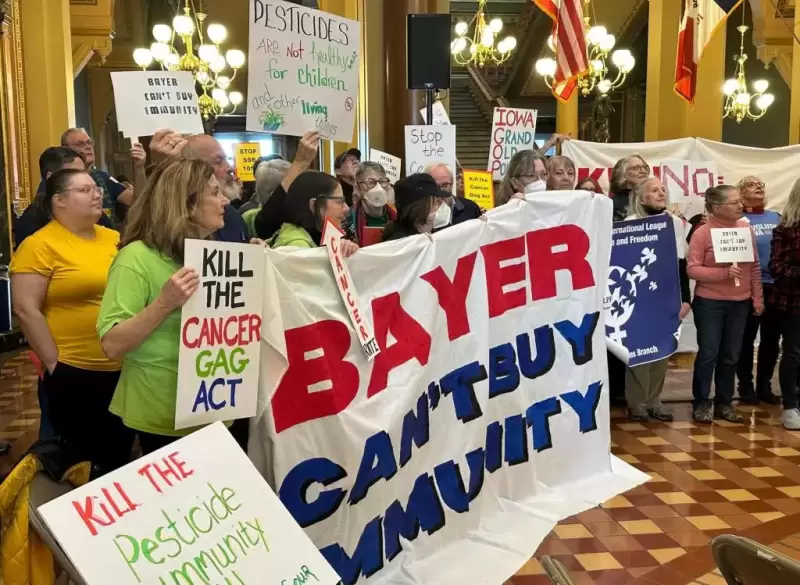 |
|
 |
|
 |
|
 |
|
 |
|
 |
|
 |
|
 |
|
 |
|
 |
|
 |
|
 |
|
 |
|
 |
|
 |
|
Cryptocurrency News Articles
New North Dakota Law Could Shield Bayer From Roundup Cancer Lawsuits
Apr 25, 2025 at 05:32 am
A new first-of-its-kind law enacted in North Dakota could shield agrochemical manufacturer Bayer from lawsuits claiming it failed to warn customers

A new first-of-its-kind law enacted in North Dakota could shield agrochemical manufacturer Bayer from lawsuits claiming it failed to warn customers that its popular weedkiller Roundup could cause cancer.
The measure, signed Thursday by North Dakota Gov. Kelly Armstrong, is among several state-level legal changes this year that could limit peoples’ ability to sue companies in state courts.
The legislation also is being closely watched by food and environmental groups, who fear it could leave people without any avenue to seek compensation for their injuries and losses.
The North Dakota law, which will take effect Aug. 1, “is a resounding win for farmers” and “sets the standard for states across America to pass legislation,” said Elizabeth Burns-Thompson, executive director of the Modern Ag Alliance, which Bayer helps finance.
Many agricultural industry groups contend glyphosate is an essential tool for farmers. They’re concerned that mounting legal costs could lead Bayer to pull the product from the U.S. market.
But food and environmental groups say the measure will make it harder for people to hold companies accountable for selling products that cause harm.
“This is a devastating blow to cancer patients and all consumers who are being poisoned by pesticides and other toxic substances,” said Jay Feldman, executive director of Beyond Pesticides, a Washington, D.C.-based nonprofit that advocates for an endpoint to toxic pesticides.
As President Donald Trump’s administration seeks to rollback federal regulations, new state laws that limit court claims could leave some people without any spac to seek compensation for their injuries and losses, Feldman said.
“The chemical companies should not be able to hide behind a weak regulatory system,” Feldman said.
Bayer, based in Germany, acquired Roundup with the 2018 purchase of St. Louis-based Monsanto. It contends glyphosate, an active ingredient in Roundup, has for decades provided a safe and efficient way to control weeds with less tilling, which helps prevent soil erosion. For crops such as corn, soybeans and cotton, Roundup is designed to work with genetically modified seeds that resist glyphosate’s deadly effect.
“Without crop protection tools, America’s consumers could face higher costs to provide for their families and put food on the table,” Brian Naber, Bayer’s president of crop science for North America, Australia and New Zealand, said in a statement praising the North Dakota law.
Armstrong declined to comment Thursday about the legislation, which he signed without fanfare a day earlier. A spokeswoman said he prefers to let the legislation speak for itself.
Bayer has been hit with about 181,000 legal claims alleging that Roundup’s key ingredient, glyphosate, causes non-Hodgkin lymphoma. Though some studies associate glyphosate with cancer, the U.S. Environmental Protection Agency has said it is not likely to be carcinogenic to humans when used as directed.
Bayer, which disputes the cancer claims, has teamed with a coalition of agricultural groups to back legislation in at least 11 states this year seeking to undercut the main argument made in the lawsuits. The bills declare that a federally approved label on pesticides is sufficient to satisfy any duty under state law to warn customers. Bayer also has asked the U.S. Supreme Court to block the legal claims.
The North Dakota legislation, more broadly, would apply to other pesticides with federally approved labels. It’s also designed to limit claims over defective products if the defects are common in the industry.
“This new law will make it harder for people to get their day in court and will ultimately leave consumers less safe,” said Sam Wagner, an agriculture and food organizer for the Dakota Resource Council, which opposed the measure.
Many legal scholars say state law generally requires companies to warn customers about the dangers of their products. In recent years, a growing number of state and federal agencies have been urging the chemical industry to phase out the use of several classes of pesticides due to safety concerns.
But the Trump administration has moved to rollback Obama-era regulations and is instead focusing on streamlining the approval process for new pesticides.
Earlier this year, the EPA announced plans to keep the current tolerances for the pesticide residues in food despite recommendations from its own scientists to lower the levels to reduce cancer risk.
The agency also is proposing to limit the types of studies that it will consider when evaluating the safety of new pesticides, a move that critics say will make it easier to approve risky chemicals.
This story has been corrected to fix the name of the Dakota Resource Council. It is not the Dakota Research Council.
Associated Press reporter Jack Dura contributed to this report.
Disclaimer:info@kdj.com
The information provided is not trading advice. kdj.com does not assume any responsibility for any investments made based on the information provided in this article. Cryptocurrencies are highly volatile and it is highly recommended that you invest with caution after thorough research!
If you believe that the content used on this website infringes your copyright, please contact us immediately (info@kdj.com) and we will delete it promptly.
-

-

-

-

-

- Pepe Coin (PEPE) Price Gearing Up for an Epic Rebound as the General Digital Asset Market Enters a Bullish Rally
- Apr 27, 2025 at 01:10 pm
- According to market data, PEPE coin surged by 5.11% in the last 24 hours to trade at $0.000008823. Within the same time frame, investors’ interest spiked by 58.72% to $1.27 billion.
-

-

- Sign up and bet with BetMGM bonus code TPOTODAY to get back up to $1500 if your first bet loses
- Apr 27, 2025 at 01:00 pm
- input: Sign up using BetMGM bonus code TPOTODAY to get back up to $1,500 ($1,500 in bonus bet + $100 if you refer a friend) if your first bet loses on Avalanche vs Stars or any other games available on the platform.
-

-




























































